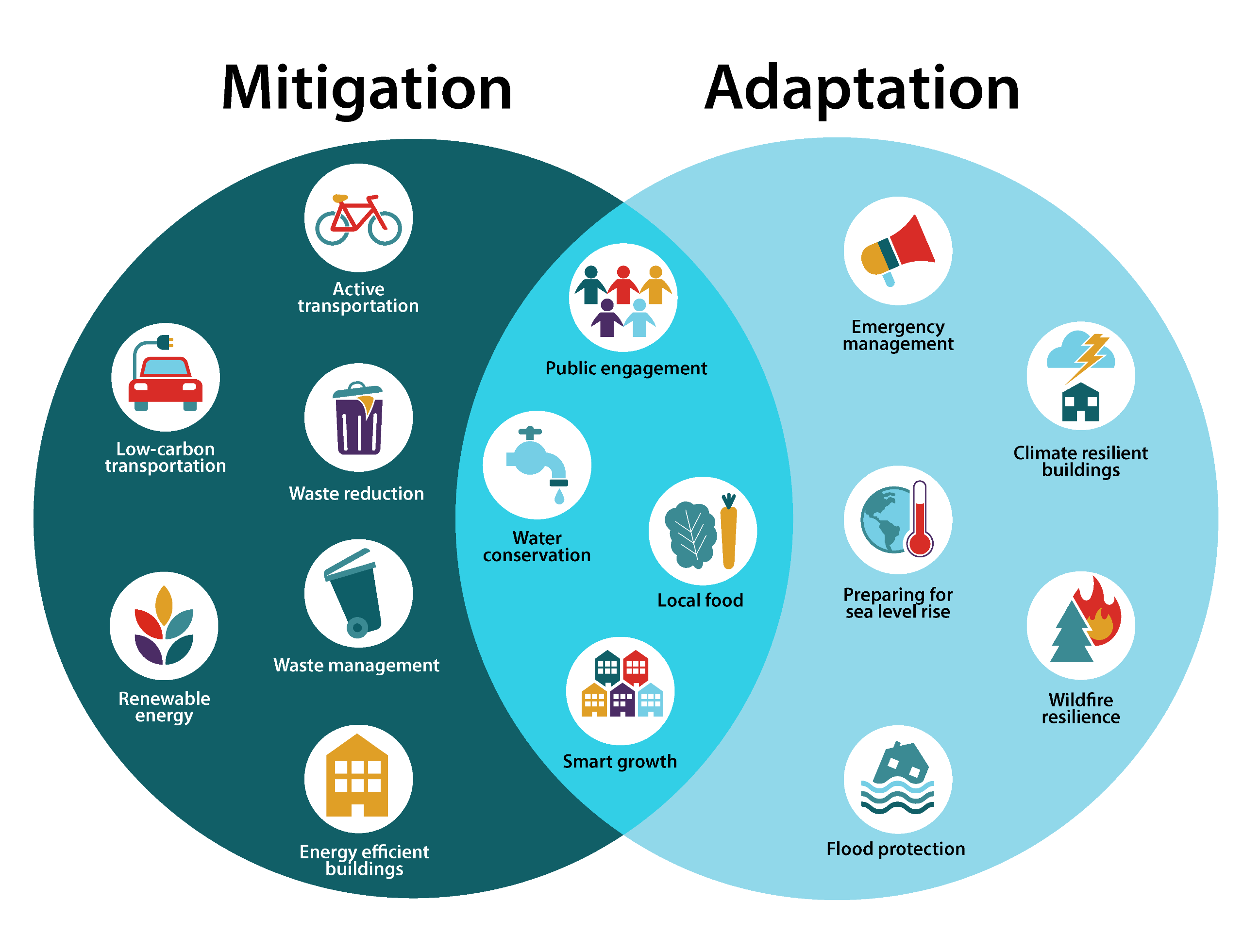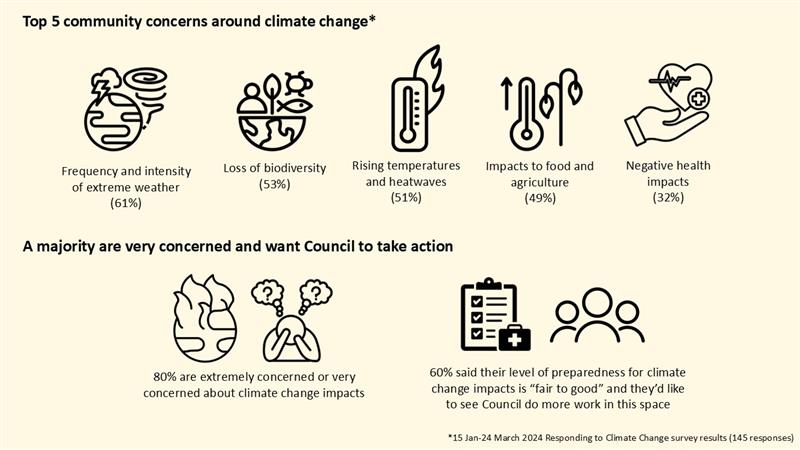Corporate Emissions Reduction Plan
Learn more and contribute to how Council can reduce emissions from our own operations and reach real zero!
To achieve Banyule's ambitious targets of becoming a zero emissions organisation by 2028 and carbon neutral municipality by 2040, we developed the Corporate Emissions Reduction Plan (2020-23). We are also creating Banyule's first Climate Adaptation Plan in 2025 with the aim of it being approved in early 2026.
Since 2020, we have made significant progress while responding to climate change including:
Learn more and contribute to how Council can reduce emissions from our own operations and reach real zero!
How has climate change impacted you and your community. How can we adapt and adjust to the changes happening around us?
In the video below, Plan 1 refers to the Corporate Emissions Reduction Plan while Plan 2 refers to the Climate Adaptation Plan. When this resource was created in 2024, Council was working toward carbon neutrality. We are now proposing a shift away from carbon neutrality/net zero to real zero, which means we are aiming to eliminate all emissions instead of relying on offsets for some emissions.
Climate mitigation and adaptation are two ways we respond to climate change. Mitigation focuses on reducing the causes, like cutting greenhouse emissions (eg. using solar panels or planting trees), while adaptation helps us adjust to the impacts, such as more heatwaves or floods (eg. building flood resistant roads or creating cool spaces in parks). Sometimes, the same action does both. For example, planting trees helps absorb carbon (mitigation) and provides shade to cool our neighbourhoods (adaptation). By combining these approaches, we can protect both the environment and our communities more effectively.
The infographic below, visually highlights the difference and the overlap.

From 15 January to 24 March 2024, we asked the community to help us shape a sustainable and resilient community.
We heard feedback through a variety of engagement activities including:
View the full findings report take a look at a summary of what we heard below.

Preliminary community and staff engagement conducted in early 2024 emphasised the community's concern for climate change impacts and the need for proactive adaptation measures. Suggested focus areas included infrastructure resilience, biodiversity preservation and sustainable transport initiatives. The feedback reflected the desire for effective climate action and community involvement in resilience building efforts.
Our community is made up of diverse cultures, beliefs, abilities, bodies, sexualities, ages and genders. We are committed to access, equity, participation and rights for everyone: principles which empower, foster harmony and increase the wellbeing of an inclusive community.
Banyule City Council is proud to acknowledge the Wurundjeri Woi-wurrung people as traditional custodians of the land and we pay respect to all Aboriginal and Torres Strait Islander Elders, past, present and emerging, who have resided in the area and have been an integral part of the region’s history.
This site is owned and operated by Banyule City Council using software licensed from Social Pinpoint. For details on how Banyule City Council collects and protects your personal information, refer to their Privacy Policy below. For details of how Social Pinpoint may access personal information, please refer to Social Pinpoint’s Privacy Policy
Banyule Council Privacy Policy
This site is managed by Banyule City Council. Your interaction with this site is also governed by Banyule City Council's Privacy Policy.
Banyule Council (Council) provides this site as a method of engaging with the community about a range of issues and projects. Council asks for feedback from the community which at times is displayed in an open forum, visible to other visitors to the site.
Registration and participation
Visitors to the site are encouraged to register with the site to provide feedback and leave comments. The registration process includes the requirement for some personal information including email address, gender, suburb of residence and year of birth. This information is used to enable Council to better understand the community of people interacting with this site. At times additional information may be asked voluntarily which could include your age, whether you have a disability, speak another language or identify with a particular community. This information is not displayed publicly but is used to ensure diverse representation from the local community. Council may also analyse the personal information given during registration and participation to better understand who is using and who is not using the site. This information may be used to assist with marketing and promotional endeavours to increase participation in the site.
For more information on Council's Privacy Policy click here.
The following Terms and Conditions govern the use of Shaping Banyule (“the site”). The platform is owned and operated by us, Social Pinpoint Pty Ltd, on behalf of Banyule.
By accessing and using this site, you are choosing to accept and comply with the Terms presented throughout this agreement as well as the Privacy Policy and Moderation Policy. These Terms apply to all visitors and users of this site. Linked sites, affiliated services or third party content or software have their own Terms that you must comply with. If you disagree with any of the Terms presented in this agreement, you may discontinue using the site immediately.
If you are under 18 years old, please ensure that your parent or guardian understands and accepts these Terms and Conditions (including the Privacy Policy and Moderation Policy).
What are the conditions with a user’s account?
While using the site, you must not violate any applicable laws and regulations. It is our duty to protect the confidentiality of content you provide on our site in accordance with our Privacy Policy. When you create an account with us, you must always provide us with accurate information. Failure to provide accurate information violates the Terms, which may result in immediate termination of your account on our service. You are responsible for protecting your own password you use for this site and for any activities done under that password. Unauthorised use of your password or account must be immediately reported to Social Pinpoint. In some cases, we or our agents may require access to your user accounts to respond to technical issues.
We are not responsible for the content on the site that has been provided by the users of the site. Any content posted by you is subject to the rules of our Moderation Policy. Your contribution to the site may be edited, removed or not published if we consider it inappropriate (refer to Moderation Policy). Contributors should also be aware that their posts may remain online indefinitely. Where practical, you may choose not to identify yourself, deal with us on an anonymous basis or use a pseudonym.
What does Social Pinpoint require from their users?
You must understand and agree that, without limitation:
Can your account be suspended or terminated?
We may terminate or suspend access to your site and/or account immediately, without prior notice, including without limitation if you breach the Terms. We may immediately deactivate or delete your account and all the related files and information in your account. After your account has been terminated, the content you have posted may also remain indefinitely on the site.
If you want to terminate your own account, please send an email to info@socialpinpoint.com.
Governing Law
These Terms shall be governed in accordance with the laws of Victoria, Australia, without regards to its conflict of law provisions.
Indemnification
Social Pinpoint, its subsidiaries, affiliates, officers, agents, licensors and other partners are not responsible for any loss, liability, claim, or demand, including legal fees, made by any third party due to or arising from a breach of this agreement and/or any breach of your representations and warranties set forth above.
What content does Social Pinpoint own?
Your Say website contains the copyrighted material, trademarks, patents, trade secrets and other proprietary information (“Intellectual Property”) of Social Pinpoint and its suppliers and licensors. Social Pinpoint owns and retain all proprietary rights in the intellectual property. All intellectual property in the content of this site including without limitation to text, software, source code, pages, documents and online graphics, photographs, sounds, audio, video and other interactive features are owned by or licensed to us.
Any original content that you submit or post on our site may be made available to the public and allows users to share your content (with the end user acknowledging your contribution) under the Creative Commons Attribution-ShareAlike 4.0 Australian License.
Except for Intellectual Property which is in the public domain or for which you have been given written permission, you may not copy, alter, transmit, sell, distribute any of the Intellectual Property.
We are not responsible for your communications or dealings, including payment and delivery of goods or services, with a third party found via our website. Any loss or damage incurred from those communications or dealings are solely between the user and the third party.
Disclaimer and Warranties
Users must agree that you use of the site is at your own risk. We make no warranty that the site will meet your requirements or be uninterrupted or error-free. Any material that the user downloads through the site is done at their own risk and are responsible for any damages to their computer system or loss of data.
What happens if these Terms change?
We reserve the right, at our sole discretion, to modify or replace these Terms at any time without notice. The most recent version of the Terms can be seen on this page. By continuing to access or use our site after those revisions become effective, you agree and will comply to the revised terms. If you do not agree to the revised terms, please discontinue using our site.
Contact Us
If you have any questions about these Terms, please contact us at info@socialpinpoint.com
Enter your email address below. We will send you instructions to reset your password.
Back to Log in
Creating an account makes it easier for you to contribute and helps us better understand your needs.
Already have an account? Log in now
Thank you, your account has been created.
Completing the questions below helps us better understand the diverse range of people who contribute their ideas. The questions are optional.
You’re using an outdated browser.
Some features of this website may not work correctly. To get a better experience we strongly recommend you download a new browser for free: